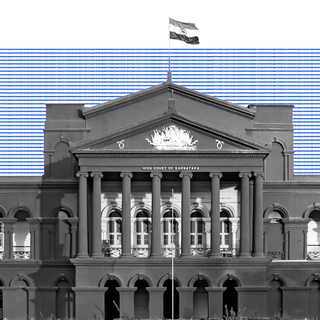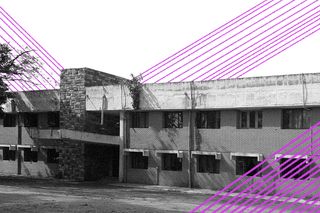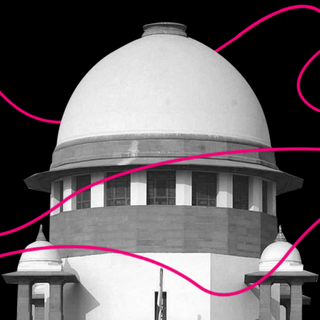
Poem On Covid19 Corpses in Ganga Is Spreading “Anarchy,” Gujarat Sahitya Akademi Says
The literary body’s statement frames the poem as dissenting — but works of literature are critical to record the truth

The Gujarat Sahitya Akademi lashed out on Thursday against poet Parul Khakkar for her poem “Shav Vahini Ganga”(“Hearse of Corpses, Ganga”). The poem was spreading “anarchy,” the literary body said.
The poem, which is a critique of the ruling party’s mismanagement of the Covid19 second wave in India, has received flak from right-leaning individuals and organizations.In a strongly-worded editorial, the Akademi’s chairman, Vishnu Pandya, called the poem “pointless angst expressed in a state of agitation.” He also said the poem is“misused by forces who are anti-Centre and anti-Centre’s nationalist ideologies,” and that those who circulated the poem are “literary Naxals.”
The statement from the eminent literary body attacks the poem’s worthiness (“it is [not] the proper way to pen down poetry”) as well as denigrates the sentimentbehind it by terming it a frustrated rant. The renunciation is a clear example of how institutions attempt to stifle truth and dissent— both important aspects of documenting a crisis through art. The poem’s inspiration — visuals of corpses floating in Ganga and other rivers — is crucial as it contradicts official claims about the scale of the death toll and crisis.
According to a translation of the editorial in The Indian Express, Pandya’s criticism goes on to note: “The said poem has been used as a shoulder to fire from by such elements who have started a conspiracy, whose commitment is not to India but to something else, who are Leftist, so-called liberals, to whom nobody pays any attention…Such people want to quickly spread chaos in India and create anarchy… They are active on all fronts and in the same way they have jumped into literature with dirty intentions. The purpose of these literary Naxals is to influence a section of people who would relate their own grief and happiness to this (the poem).”
Related on The Swaddle:
Tell Me More: Talking Poetry and Protest With Shantanu Anand, Co‑Founder of Airplane Poetry Movement
“Shav Vahini Ganga” is the first work of protest poetry from Khakkar, who is otherwise known for writing devotional bhakti poems. Her poem about the suffering of people during the Covid19 second wave, posted in Gujarati on her Facebook (now on private), instantly went viral and was recently translated into Assamese, Hindi, English, and Tamil; with Bhojpuri, Malayalam, and Bengali translations in progress.
Publishing this poem took her from being a poet who was once called “the next big icon of Gujarati poetry” to a target of the BJP IT cell. She received over 28,000 abusive and misogynistic comments on her social media post, with people calling her everything from “anti-national” to “a woman with loose character and no moral values.”
Since 2019, protest poetry has seen a massive mainstream resurgence due to the CAA-NRC protests. However, India has a long history of vernacular protest poetry, ranging from heavy criticisms against then Prime Minister Indira Gandhi during the Emergency to Miyahpoetry in the 21st century protesting the National Registry of Citizens in Assam. Hindu religious poetry in itself has a powerful history of dissent — from Meerabai’s protest against patriarchy to Kabir’s protest against norms of devotion.
All works of art serve a critical role during any crisis — they keep an honest record of the crisis as it unfolds. Memories fade and, along with it, so does accountability. Without artists taking up the responsibility of preserving history, the powerful may never answer for their misdoings. This is especially relevant in the Covid19 pandemic in India, with mainstream sources of information spiraling rapidly into a vortex of fake news and politically driven propaganda.
While Khakkar still remains pro-BJPaccording to her friends and family, her poetry is a reflection of her(and the country’s) distress at the wrongful death of India’s citizens:
Parul Khakkar’s poem translated into English by Salil Tripathi:
Don’t worry, be happy, in one voice speak the corpses
O King, in your Ram-Rajya, we see bodies flow in the Ganges
O King, the woods are ashes,
No spots remain at crematoria,
O King, there are no carers,
Nor any pall-bearers,
No mourners left
And we are bereft
With our wordless dirges of dysphoria
Libitina enters every home where she dances and then prances,
O King, in your Ram-Rajya, our bodies flow in the Ganges
O King, the melting chimney quivers, the virus has us shaken
O King, our bangles shatter, our heaving chest lies broken
The city burns as he fiddles, Billa-Ranga thrust their lances,
O King, in your Ram-Rajya, I see bodies flow in the Ganges
O King, your attire sparkles as you shine and glow and blaze
O King, this entire city has at last seen your real face
Show your guts, no ifs and buts,
Come out and shout and say it loud,
“The naked King is lame and weak”
Show me you are no longer meek,
Flames rise high and reach the sky, the furious city rages;
O King, in your Ram-Rajya, do you see bodies flow in the Ganges?
Aditi Murti is a culture writer at The Swaddle. Previously, she worked as a freelance journalist focused on gender and cities. Find her on social media @aditimurti.
Related


Digital Textbooks To Be Available in Audio, Visual Formats For Students With Disabilities: Govt
